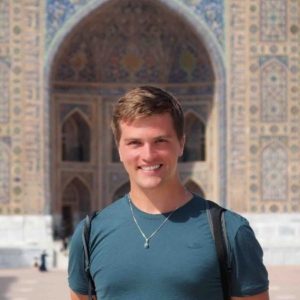Blog
Student Spotlight: Mark Jahnke
Written by Sara Dada
June 15, 2018
Our first-ever Student Spotlight focuses on Mark Jahnke, a Fulbright Scholar who is undertaking a MSc in Development Studies at SOAS, and recent LIDC intern. Prior to SOAS, Mark spent over two years in the Kyrgyz Republic in Central Asia training health promotion staff and mentoring NGO leaders to improve the efficiency of their organisations and effectiveness of their programming. His blog, Monday Bazaar, was a winner of the 2016 Peace Corps Blog It Home award. In addition to his work in Kyrgyzstan, Mark previously has worked and studied in Argentina, Iran, Tajikistan, Senegal, China, Qatar, and across Europe.
- Can you tell us about your field of research?
I am currently in Kyrgyzstan researching Kyrgyzstan’s policies to address HIV/AIDS in the country, which by extension also explores policies related to key groups that are at high risk for HIV, in particular people who inject drugs. I first became interested in this subject during my junior year at Harvard, when I was completing a secondary field in Global Health and Health Policy. After being introduced to the biosocial approach to global health, while researching my primary concentration courses on Iran, I learned that the WHO actually recognises Iran’s HIV program as a best practice model for addressing HIV in injecting drug use communities.
I ended up spending 18 months researching the topic for my undergraduate dissertation, and I had the chance to travel with my brilliant dissertation supervisor, Dr. Navid Madani, to Tehran and Esfahan, Iran to attend the 1st International and 5th National HIV/AIDS Congress. I also spoke with a large number of Iranian academics and health care providers and got a first-hand view of the country’s program. My time working there led me to apply to work with HIV NGOs working with injecting drug users in Osh, Kyrgyzstan, through the US Peace Corps. I’m very happy to have the chance to research the issue from the policy side after having worked on the front lines here for two years.
- What led you to apply for the Fulbright scholarship?
I applied to the SOAS-Fulbright Partnership Award because SOAS is recognised worldwide for the strength of its programs in Development Studies and regional anthropology of Central Asia and the Middle East. As far as I know, it’s the only school in the world to offer a Development Studies course that specialises in Central Asia. Given that I had been working in that sector for over two years, this seemed like an absolutely perfect fit for where I wanted to take my research. Since coming to SOAS, I’ve had the opportunity to explore additional facets of the region from the top level. I’ve also had the chance to speak about my work at TEDx SOAS: Millennial Challenges, and at the University of Warwick and the University of Lincoln, in addition to previous presentations at Georgetown School of Foreign Service in Qatar and Harvard University among others.
- What would someone be surprised to learn about you?
A lot of people don’t know that I was a competitive figure skater for around 12 years until my last year of undergraduate studies. I was training around 30 hours each week while maintaining a full course load at Harvard and travelling every other month to competitions around the US. I’ve been able to take the discipline and self-awareness I learned from skating into all kinds of other endeavours since then, including six marathons and two months of intensive tango school in Argentina.
- Where do you see yourself in 10 years?
10 years is a long way away, but some might be surprised that I certainly don’t see myself in academia. If my time working in development has taught me anything about myself, it’s that I love working in the field and focussing on solutions that are driven based on local needs and in consultation with local capabilities. If I’m going to criticise something in a country that is not my own, I need to be sure that I understand it well and that I propose solutions that are feasible and realistic based on the context. Based on that, I imagine I’ll probably be working in some sort of capacity as a development advisor, hopefully making frequent trips back to Central Asia. But 10 years is a long time and I’m not ready to rule anything out just yet!
- What advice do you have for any future students in the field?
Get out to the field, and for long periods of time. Don’t just sit in the library and read. I think the most important lesson I’ve learned about development and Central Asia is that you cannot speak about them in monolithic terms; even individual countries cannot be spoken about in generalities. To truly know a region, you must spend time there living, travelling, working, and speaking to people outside the largest cities. Only through that kind of human interaction can you start to take the first steps to understanding the people of a region, the potential they have and the challenges they face. Through that, often you’ll realise that no book can paint as nuanced a picture as time in the field.

